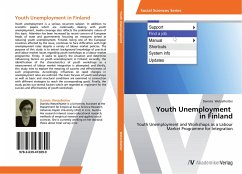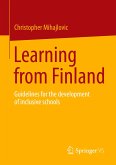Youth unemployment is a serious recurrent subject. In addition to scientific papers which are continually dealing with youth unemployment, media coverage also reflects the problematic nature of this topic. Attention has been increased by recent concern of European heads of state and governments focusing on measures aimed at reducing youth unemployment. Finland, being one of the European countries affected by the issue, continues to face difficulties with high unemployment rates despite a variety of labour market policies. The purpose of this study is to extract background knowledge of practical and labour market issues regarding youth workshops as a labour market programme. Firstly, it seeks to specify the situation and determine influencing factors on youth unemployment in Finland; secondly, the identification of the characteristics of youth workshops as a measurement of labour market integration is attempted; and thirdly, this study tries to explore the meaning of success and effectiveness of such programmes. Accordingly, influences on rapid changes in unemployment rates are outlined. The main focuses of youth workshops as well as basic and structural conditions are examined in connection with different strategies to reach the corresponding goals. Finally, the study points out several factors which are regarded as important for the success and effectiveness of youth workshops








